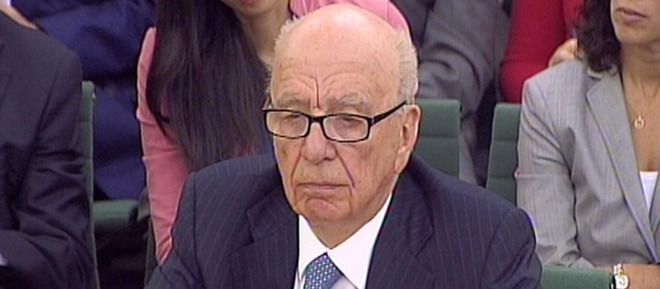Why being Rupert Murdoch means always having to say you’re sorry
Is the News Corp. CEO being deceitful, demented or just stubborn?
Share
 Rupert Murdoch and his son James delivered an unbearable performance before a British parliamentary committee on Tuesday, not because of Rupert’s feigned modesty or his son’s mid-Atlantic accent (the kind that says I’ve attended every single prep school in the English speaking world), but because it was so hard to tell whether the beleaguered press baron’s long pauses were signs of deceit or dementia. Octogenarians, it turns out, make lousy villains.
Rupert Murdoch and his son James delivered an unbearable performance before a British parliamentary committee on Tuesday, not because of Rupert’s feigned modesty or his son’s mid-Atlantic accent (the kind that says I’ve attended every single prep school in the English speaking world), but because it was so hard to tell whether the beleaguered press baron’s long pauses were signs of deceit or dementia. Octogenarians, it turns out, make lousy villains.
The 80-year-old CEO of News Corporation appeared before the Culture, Media, and Sport Select Committee to to answer questions about the illegal phone hacking that took place at his now-defunct tabloid, News of the World. But Murdoch wasn’t going to own up to his misdeeds so easily: when asked by a committee member if he was personally responsible for phone the hacking, which included the breach of murder victim Milly Dowler’s voicemail, and of phones belonging to fallen soldiers’ families), the CEO responded with a resounding ‘no.’ It was the only forthright answer he gave the entire hearing, and it sent a very clear message about the extent of his remorse. “I feel that people I trusted—I don’t know who, on what level—have let me down, and I think they have behaved disgracefully, and it’s for them to pay.” Note the absent pronoun. In the land of the Queen, Murdoch neglected to use the royal ‘we’.
What CEO in the same position hasn’t been equally cynical you might ask? Consider Michael McCain, CEO of Maple Leaf Foods Inc. When 23 people died in 2008 after eating the company’s cold cuts, McCain wasn’t personally responsible for the listeria outbreak that poisoned them. But he took responsibility anyway. Sure, McCain managed meat, and Murdoch manages people, but manage is the operative word. As British MP Chris Bryant told former News of the World editor Rebekah Brooks recently, “Managerial and executive negligence is tantamount to complicity.” “Our best efforts failed,” McCain said in his now-legendary apology, “and for that we are deeply sorry.” That, Rupert, is the royal We, wielded royally.
It’s possible Murdoch didn’t know about the gross ethical breaches that were taking place inside his press mill, but even if he didn’t, his inability to hold himself personally accountable is an ethical breach all on its own. Interestingly, it’s also a self-imposed sentence. Where McCain’s upfront admission of guilt made him instantly sympathetic, Murdoch’s claim that he’s uniquely clean makes him look all the more dirty.
When the Murdoch clan finally did get around to using the plural first person, it was left to the Spawn of Rupert—wily James—to do it. James was the spitting image of his father at Tuesday’s hearing, complete with near-identical navy suit, wire framed glasses, and the moral compass of a beetroot. When one of the law-makers on the committee asked him if News Corp. had launched its own formal investigation following allegations of phone hacking and habitual police bribery, this was his most conscientious response: “We have established a group in the company cooperating very closely with the police on their investigation. Their investigation is broad…and the policy and the direction that the company has given them is to cooperate fully and transparently with police to provide information and evidence that the company believes and they believe is relevant to those investigations.”
Never mind that his alternative to a toxic press-police relationship is a near-identical extension of that same relationship. His failure to launch an internal investigation proves that the Murdochs aren’t even mildly interested in purging toxic elements from any of their media outlets. Even more outrageous than his garbled response, though, was James’ assertion that News Corp.’s recent withdrawal of a massive bid to purchase European broadcaster BSkyB reflects the company’s “priority” to clean its act up. Unfortunately for James, it doesn’t take a roomful of British lawmakers to recall that immediately before News Corp. withdrew its bid, every major political party in England planned to introduce a motion preventing Murdoch from purchasing the broadcaster in the first place. If James Murdoch wants to convince us he’s a good person, he’d do well to stop assuming we’re stupid first.
But at least James looked like he was trying: His father’s exercise in redemption was (barring the pie incident) the most bizarre moment in the entire hearing, and it came at the very beginning: a little omen that we would never hear the word we—royal or otherwise—fall from his lips. “I would like to just say one sentence,” Murdoch said, interrupting his son mid-speech, and looking up into the committee., “This is the most humble day of my life.”
Never mind that he probably meant “humbling” (otherwise he was boasting, not confessing). What truly jarred was the quality of the person making the pitch. As Golda Meir once said, “Don’t be so humble. You aren’t that great.”